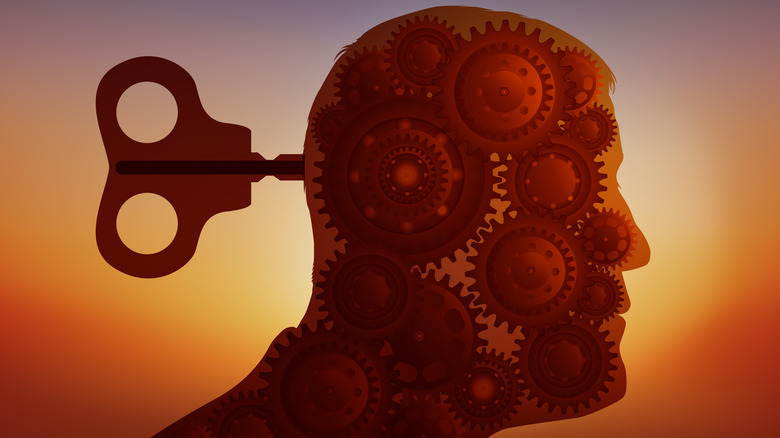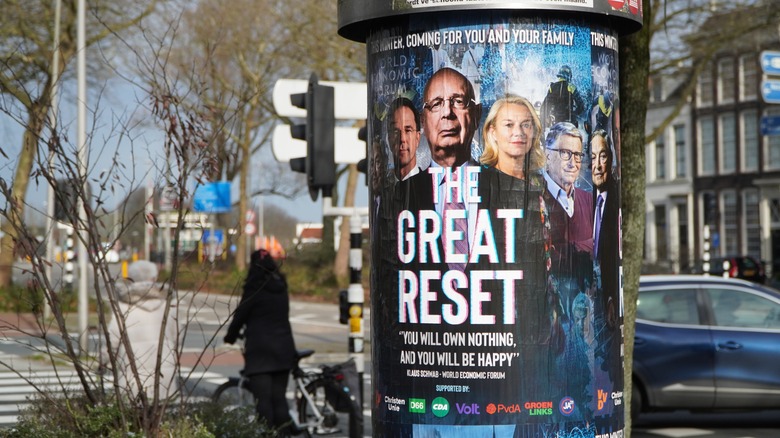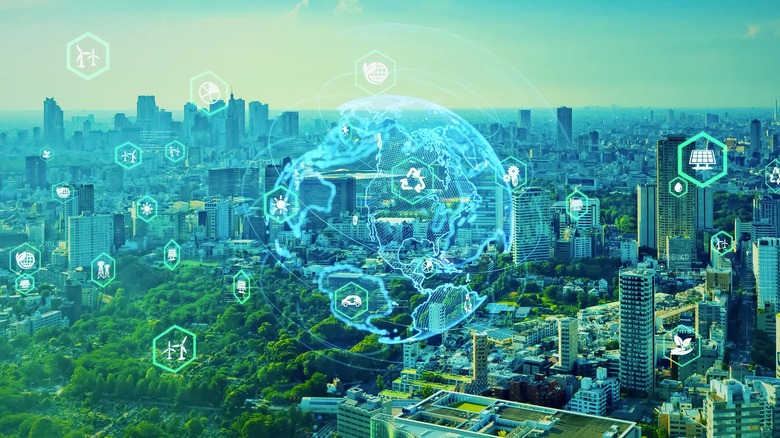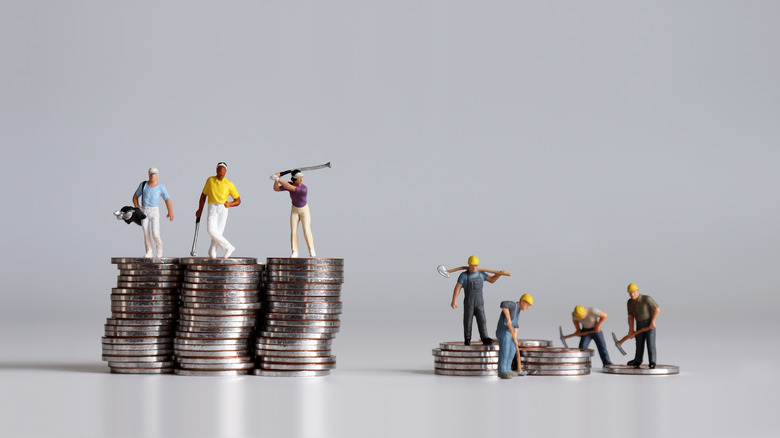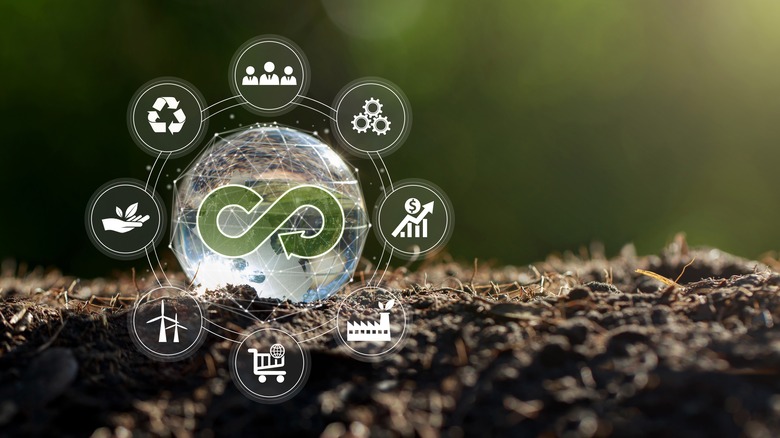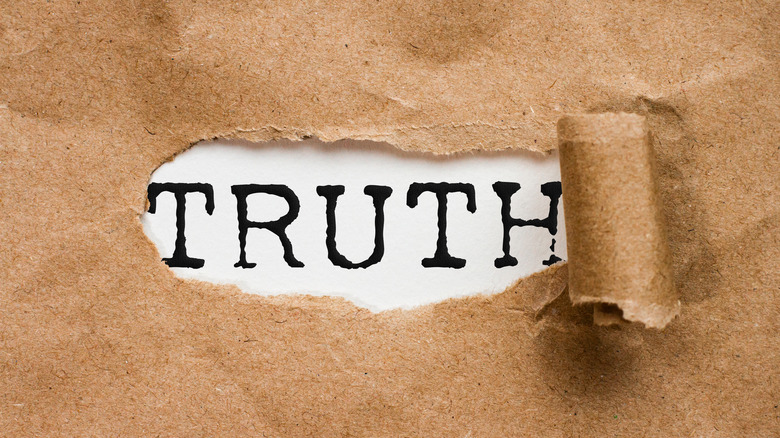What Is The Great Reset Conspiracy Theory?
Social media has revolutionized the way humans communicate with one another, but not always for the better. Even though we live in a world with seemingly unlimited access to knowledge, this hasn't stopped some from using this to spread fake news, conspiracy theories, and the like. Recently, online groups have been peddling the idea of uprooting modern society with a "Great Reset" secretly enacted by the world's most powerful economic leaders. So is there really a group of evil Lex Luthers planning to overthrow all governments and establish a New World Order, or is this just another example of misinformation taking over the political scene?
According to the Anti-Defamation League, this all started when the World Economic Forum (WEF) held a summit in June 2020, right when COVID-19 was ravaging the world. The World Economic Forum's website says the WEF is an "International Organization for Public-Private Cooperation." Since 1971, the group has advocated for the "stakeholder theory" — the idea that all organizations, including private businesses, are responsible for the well-being of the planet and society as a whole. In other words, businesses shouldn't be solely motivated by making a profit, they should work to create a sustainable, just planet for all.
What is the Great Reset?
Klaus Schwab, the founder of the World Economic Forum, released an article explaining the organization's idea for a so-called "Great Reset of capitalism" highlighting what he believed were the three main goals of this new initiative: A more equitable global society, higher investment in public services, and harnessing innovation from the private sector. Schwab advocates for governments to establish new wealth taxes, fairer trade, and curb the energy sector's dependence on fossil fuels (via the World Economic Forum).
Notably, these ideas were very vague, and the initiative lacks many details to accomplish these goals. Instead, Schwab emphasized his belief that all leaders should just keep these ideals in mind when developing global industry and public policy, something that has garnered lots of legitimate criticism. But the conspiracy theories about the Great Reset haven't surfaced because of the forum's goals, many other factors have contributed. For one, the World Economic Forum is an international organization that is partnered with some of the world's most powerful people, which itself causes the public to be skeptical of their motives. Add the words "Great Reset" on top of that and you could probably understand why some might be alarmed by this.
Fuel to the fire
Besides general skepticism of world leaders advocating for the Great Reset, online conspiracy theorists have been connecting this initiative with other pieces published by the World Economic Forum, such as the futuristic fiction article published by the WEF themselves, "Welcome To 2030: I Own Nothing, Have No Privacy And Life Has Never Been Better." The story starts with an unidentified person describing their life in a city in 2023.
In this world, people don't own anything. Transportation is free for everyday citizens via self-driving cars, algorithms do all your shopping, living spaces are free and used for different people when you're not occupying the residence, and tools are delivered to you at a need-based rate, returning them when you are finished with your given task (via Forbes). People have no privacy since being connected to this interconnected web of services prevents anyone from living off the grid. This utopian vision is not shared by everyone, however, and the idea of having no personal possessions can be very frightening, which has only added fuel to the Great Reset conspiracy theory. What's more, according to the ADL, this fear is being stoked by some well-known conservative figures who have a lot of sway with their audiences.
A call to re-evaluate
With all of this combined, people have become confused as to what the Great Reset is. Liz Wheeler, a prominent conservative online figure and advocate of the conspiracy theory said the mission "... advocates [for] replacing capitalism with an economic system that is 'kind of socialism, kind of communism' but 'mostly just fascism'" (via PolitiFact). However, Adrian Monck, the managing director of the World Economic Forum told PolitiFact that Wheeler's explanation is "ludicrous."
According to Klaus Schwab, the call for a Great Reset during the darkest days of the coronavirus pandemic was an effort to make sweeping changes to benefit the well-being of humanity in regard to health, education, and opportunity, similar to what was done after World War II. He wrote in October 2020 (via WEF) that neoliberal ideology needs to be "re-evaluated with an open mind" and capitalism, while important, should also be "reconsidered" in modern terms.
Schwab wrote: "But we must rethink what we mean by 'capital' in its many iterations, whether financial, environmental, social, or human. Today's consumers do not want more and better goods and services for a reasonable price. Rather, they increasingly expect companies to contribute to social welfare and the common good. There is both a fundamental need and an increasingly widespread demand for a new kind of 'capitalism' ... The reset that we need is not a revolution or a shift to some new ideology. Rather, it should be seen as a pragmatic step toward a more resilient, cohesive, and sustainable world."
The circular economy
The World Economic Forum has never advocated for any particular political system. The organization highlights its belief in the need for the private sector and businesses to exist in the new economy, something that socialists and communists usually oppose since they don't believe private individuals should own the means of production. The World Economic Forum has also never advocated for segregation, inequality, or persecution of any group, something that fascists support. As defined by the WEF itself, the Great Reset refers to the goal of reforming capitalism to promote sustainability, not just profit.
The organization has advocated for the "circular economy," which calls for reducing waste by incentivizing our economy to reuse goods and services. For example, instead of producing goods, consuming them, and then throwing them away, companies would make goods that can be repaired, or recycled. This would be promoted through legislation and policy action taken by local governments (via the World Economic Forum).
Having real dialogue
In this hypothetical "kind of communist, mostly fascist" totalitarian government, conspiracy theorists also believe that world leaders will bring forced inoculation, implement social credit systems, and redistribute all wealth evenly between everyone, according to The Guardian. Many popular news outlets, like Fox News and Sky News, have had reporters spread this conspiracy on their shows as well (via The Guardian).
Although the notion that the Great Reset is an extremely diabolical plan may be a stretch, that doesn't mean all criticism of the initiative or of the World Economic Forum itself hasn't been legitimate. As mentioned earlier, the plan lacked a concise plan of action to achieve this level of sustainability and equality, which has been a real concern to some individuals. However, some bad-faith actors have misused terms like the "stakeholder economy" and the "circular economy" to mean something more malevolent than defined, which stalls any progress toward dealing with the situation at hand. Regardless of disagreements on how to tackle some of the most pressing issues of our time, from climate change to global wealth inequality, it all starts with an honest discussion between individuals.
